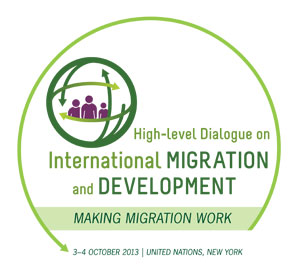High-level meetings of the 68th Session of the General Assembly
3-4 October 2013 - High-level Dialogue on International Migration and Development: "Making Migration Work"
Member States have unanimously adopted a Declaration that calls for the respect of human rights and international labour standards, reiterates the commitment to fight human trafficking and strongly condemns manifestations of racism and intolerance.

Why a High-level Dialogue?
In 2013, the number of international migrants worldwide reached 232 million. Migration can bring substantial benefits, but can also have negative consequences. Both developing and developed economies need migrants to meet the demand for workers with different levels of skills.
There is mounting evidence that, leveraged by the right policies, migrant and diaspora communities can significantly contribute to development in both origin and destination countries, through remittances, trade, investment, creation of enterprises, and transfer of technology, skills and knowledge. At the same time, there is concern that the emigration of skilled professionals may hinder the attainment of development goals, such as the Millennium Development Goals, especially in small developing countries.
Many migrants are able to move, live and work in safety and dignity. Yet others are compelled to move as a result of poverty, a lack of decent work, human rights violations, armed conflict, persecution and environmental degradation. In the absence of regular migration opportunities, migrants resort to irregular migration channels. In their new homes, many migrants face exploitation, discrimination and xenophobia, while their contributions to the host society go largely unrecognized.
In brief, migration in the context of globalization brings opportunities and challenges, which need to be addressed in a comprehensive fashion. This is why the UN convened the High-level Dialogue on International Migration and Development from 3-4 October 2013 with an eight-point agenda for action on making migration work![]() .
.
- Programme of the High-Level Dialogue on International Migration and Development
- Statements delivered in the plenary meetings (PaperSmart)